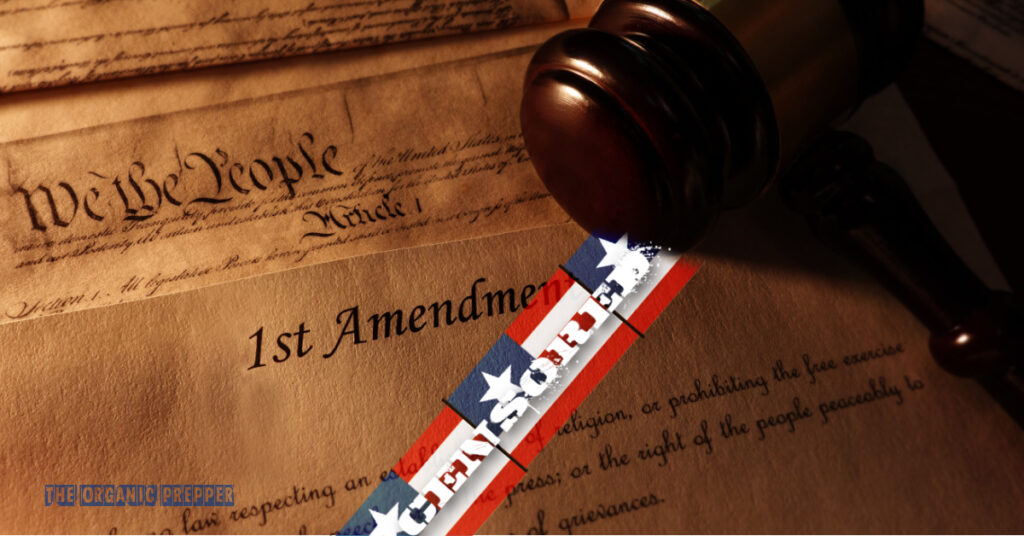by John Kennedy, Activist Post:

The United States government, which prides itself in being the leading force in defending freedom throughout the world, has a history of putting a muzzle on news organizations and individuals throughout its history. From the early colonial period to the beginnings of the internet, the state has consistently silenced its critics, which seems to be its true nature.
TRUTH LIVES on at https://sgtreport.tv/
The Sedition Act of 1798
Signed into law by the Federalist Party president John Adams on July 14, 1798, the Sedition Act made it illegal to print, utter, or publish any false, scandalous, and malicious writing about the government. Section 2 of the Sedition Act outlines the punishment for violating this new law: “Such person, being thereof convicted before any court of the United States having jurisdiction thereof, shall be punished by a fine not exceeding two thousand dollars, and by imprisonment not exceeding two years.”
This law was a blatant violation of the First Amendment in the Constitution, which was ratified only nine years before. The act finally expired after Thomas Jefferson was elected in 1800, and all those convicted under the act were pardoned. However, this would not be the last time the US government tried to use what Jefferson said was a “rod of iron” to silence others.
Censorship in the Civil War
During times of peace, people may not be as willing to give up their or other people’s liberty. During times of war, however, the propaganda produced by the state will convince people that certain rights must be curbed in the name of security and victory and to protest this would be unpatriotic. The First Amendment Encyclopedia analyzes the actions of censorship taken by the Union during the Civil War and their justification for such actions. The article states: “Throughout the war, newspaper reporters and editors were arrested without due process for opposing the draft, discouraging enlistments in the Union army, or even criticizing the income tax.”
To the Union military and government, this censorship was necessary to ensure victory against the rebels, even if the First Amendment had been violated. President Abraham Lincoln, in The Truth from an Honest Man, furthered this excuse by proposing the question of whether he should “shoot a simple-minded soldier-boy who deserts, while I must not touch a hair of a wily agitator who induces him to desert?”
Some Northerners bought into this and started riots that targeted newspapers such as the Stark County Democrat in Canton, Ohio. The editor for this newspaper, Archibald McGregor, would later be arrested on unspecified charges. The town’s Republican postmaster accompanied the soldiers making the arrest, lending credibility that the charges had been politically motivated.
World War I and the Espionage Act
A common theme among the Union leadership’s justification for censorship was national security, that all opposition to the war would sow discontent among the troops and cause desertion and ultimately defeat. In April 1917, when the United States entered the Great War against the Central powers, President Woodrow Wilson declared that Germany had “filled our unsuspecting communities and even our offices of government with spies and set criminal intrigues everywhere afoot against our national unity.”
With this, President Wilson passed the Espionage Act in 1917. This law gave the Department of Justice the power to charge individuals for disloyalty and gave the postmaster general the power to restrict mail. The Supreme Court, an institution allegedly created to interpret the Constitution, not only failed to protect free speech but furthered its determent. In the 1919 case Schenck v. United States, the Supreme Court ruled that Schenck posed a “clear and present danger” after distributing leaflets suggesting that the military draft was a form of involuntary servitude and therefore a violation of the Thirteenth Amendment. The Schenck case inspired Justice Oliver Wendell Holmes’s infamous “shouting fire in a theater” statement to justify suppressing free speech.
Ultimately, the Espionage Act saw 2,168 people prosecuted by the end of the war, and according to the Foundation for Individual Rights and Expression, 1,055 of these people would be convicted and punished with fines up to $10,000 and up to twenty years imprisonment.
World War II and Vietnam
After the United States was attacked at Pearl Harbor and entered World War II, President Franklin Roosevelt signed Executive Order 8985, which established the Office of Censorship, without approval from Congress. President Roosevelt gave the director of the Office of Censorship the power to censor international communications at his absolute discretion. The National Archives provides us with actions of censorship taken by high-ranking government officials such as the war secretary and Federal Bureau of Investigation director J. Edgar Hoover:
On December 8, 1941, the secretary of war ordered corps area commanders to inaugurate censorship of telephone and telegraph wires crossing international borders. Three days later, FBI director J. Edgar Hoover, on presidential authority, helped set up a postal censorship program to be carried out by the War Department. He was ordered to hold this temporary position until his civilian replacement could be chosen.
The Office of Censorship was abolished under Executive Order 9631 in 1945, but the tone toward free press and government would enter a new era. With the introduction of televised news into American households, any event such as wars could now be recorded and presented to millions of people. So, when the Vietnam War started, people believed they could see firsthand what it was like on the ground. However, as the Harvard Crimson writes:



